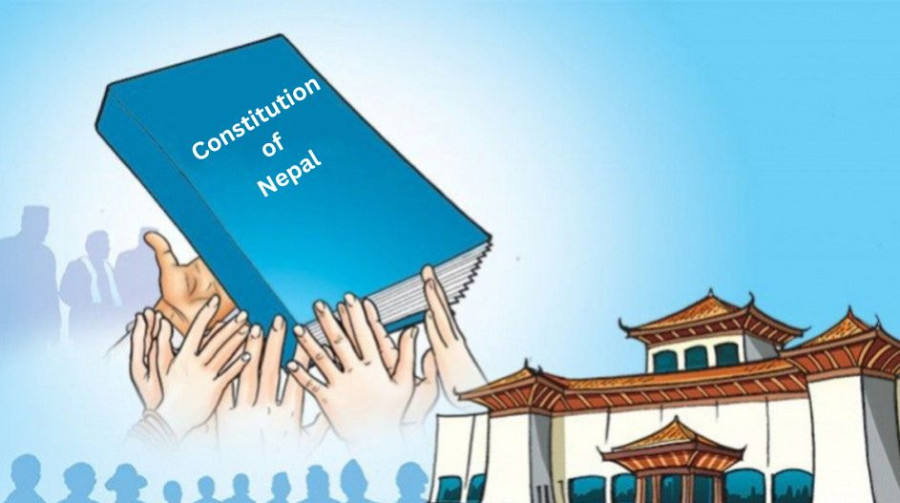Columns
Constitution amendment debate
We must consider all sides instead of ramming through amendments based on parliamentary strength.
Deepak Thapa
There is no doubt that the promulgation of the Constitution of Nepal, 2015, nine years ago, was a significant accomplishment. That was primarily because it represented the realisation of the decades-old national dream of being governed by a constitution drafted by a sovereign body elected by the people of Nepal. Due to its “fast-tracked” provenance, the kind of deliberations that would have granted it much greater legitimacy was sorely missing. Even so, it was a milestone in Nepal’s history.
That momentous achievement was, however, marred by the somewhat contradictory turn of events in that it was adopted in the face of opposition by a large section of the populace, particularly from the Tarai. While the royalist Rastriya Prajatantra Party had expectedly voted against the republican and secular constitution, all the Madhesh-based parties had boycotted the proceedings altogether. The main grouse of the latter was the delineation of provincial boundaries, but there were also strong misgivings over the distribution of parliamentary constituencies as well as restrictions on the right of women to pass citizenship to their offspring.
The whys and the wherefores
With the political space heating up amidst talk of amending the constitution following the Nepali Congress-UML pact, we appear to be headed for another round of acrimony. As per the two-party agreement, the express purpose of the amendment would be to identify the constitution’s “strengths and weaknesses and complexities that have emerged in practice” which have contributed to Nepal’s chronic political instability. Party leaders have been clear that their main target is the current mixed electoral system, particularly proportional representation (PR), which they are more than quite certain is the primary cause for the never-ending making and breaking of governments. It is a different matter that our own experience from the 1990s clearly indicates otherwise, and other countries that have adopted PR have not been similarly blighted by the kind of instability that has become the hallmark of Nepali politics.
Beyond that, given the two parties’ record, there was immediate suspicion that they would try to do away with some of the more progressive elements of the constitution. The Nepali Congress leader, Sher Bahadur Deuba, has in the past hinted secularism could be up for negotiation. And while Prime Minister KP Sharma Oli has maintained that any amendment would lead to an even more liberal document, given his earlier stance on issues such as inclusion and devolution of provincial authority, there are reasons aplenty to consider his assertion with a block of salt.
Besides the political parties, there have been similar calls from the judicial sector as well. Two prominent recently retired Supreme Court justices who had both served on the court’s constitutional bench have spelt out the need for amendments. Anand Mohan Bhattarai believes that it should begin with the political leadership first identifying where the bottlenecks are. The second jurist, Ishwor Khatiwada, goes further and argues that each and every article of the constitution should be up for review, albeit for the purpose of improving them and not to fulfil the interests of any political party. The latter, obviously, is the crux of the problem. Without doubt, there will be some fiddling with the constitution; it is only a question of when, not if.
Self-inquiry before self-interest
Now that he is out of office, the Maoist supremo, Pushpa Kamal Dahal Prachanda, has suddenly felt the need to re-embrace the agenda that propelled him to power but which he had lost sight of in his extended romp in the nation’s highest offices. Thus, he says that his party would be amenable to constitutional amendments provided there are no “attempts to shrink the rights of the citizens and dismiss the achievements in the name of the constitution amendment”.
Perhaps, it was the still-muted pushback that prompted Deuba to clarify that the provinces would remain, and instead, the focus would be on strengthening the provincial structure. He also said that many groups in the country will have to be provided with proportional representation in governance structure. “This country belongs to everyone,” he said somewhat sagely.
The hard sell, of course, will be to the Madhesh-based parties. For instance, the president of the Tarai Madhesh Loktantrik Party, Brikhesh Chandra Lal, writes that the move by the ruling coalition could be a cover for “extreme nationalism” which would ultimately negate sub-national identities. He believes such a move “could increase the possibility of the country getting stuck in a permanent conflict”. Conflict does not necessarily mean violence, but the kind of upheaval Lal warns about will have the same deleterious effect overall. Hence, the need to tread carefully and take all sides into confidence instead of ramming through amendments on the basis of parliamentary strength.
I do not think the NC-UML combine would opt for a path of confrontation. Going back to Deuba, we can take heart in his words that there was no need to distrust them since both parties have emerged out of the struggle for democracy. “Personally, I first met him [Oli] in jail. We have both fought for democracy. As parties that fought for democracy throughout our student life and jail experiences, there is no way we can go against democracy.”
One can read something in his use of the now-discredited “prajatantra” to refer to democracy instead of the more-favoured “loktrantra”. But it could easily just have been a momentary lapse, attributable to his advanced age.
Age did not hamper someone else in lucid expression though. In the summer of 1787, at the end of the rather raucous convention that drafted the American constitution, 81-year-old Benjamin Franklin, by then the elder statesman in the room, made a statement that rings true for all time: “I confess that there are several parts of this constitution which I do not at present approve, but I am not sure I shall never approve them: For having lived long, I have experienced many instances of being obliged by better information, or fuller consideration, to change opinions even on important subjects, which I once thought right, but found to be otherwise. It is therefore that the older I grow, the more apt I am to doubt my own judgment, and to pay more respect to the judgment of others.”
Those wise words should guide our politicians even as they begin discussions on changes to the constitution. We can only hope that they are capable of the same humility borne out of a lifetime of self-enquiry that Franklin articulated so eloquently.




 15.87°C Kathmandu
15.87°C Kathmandu















